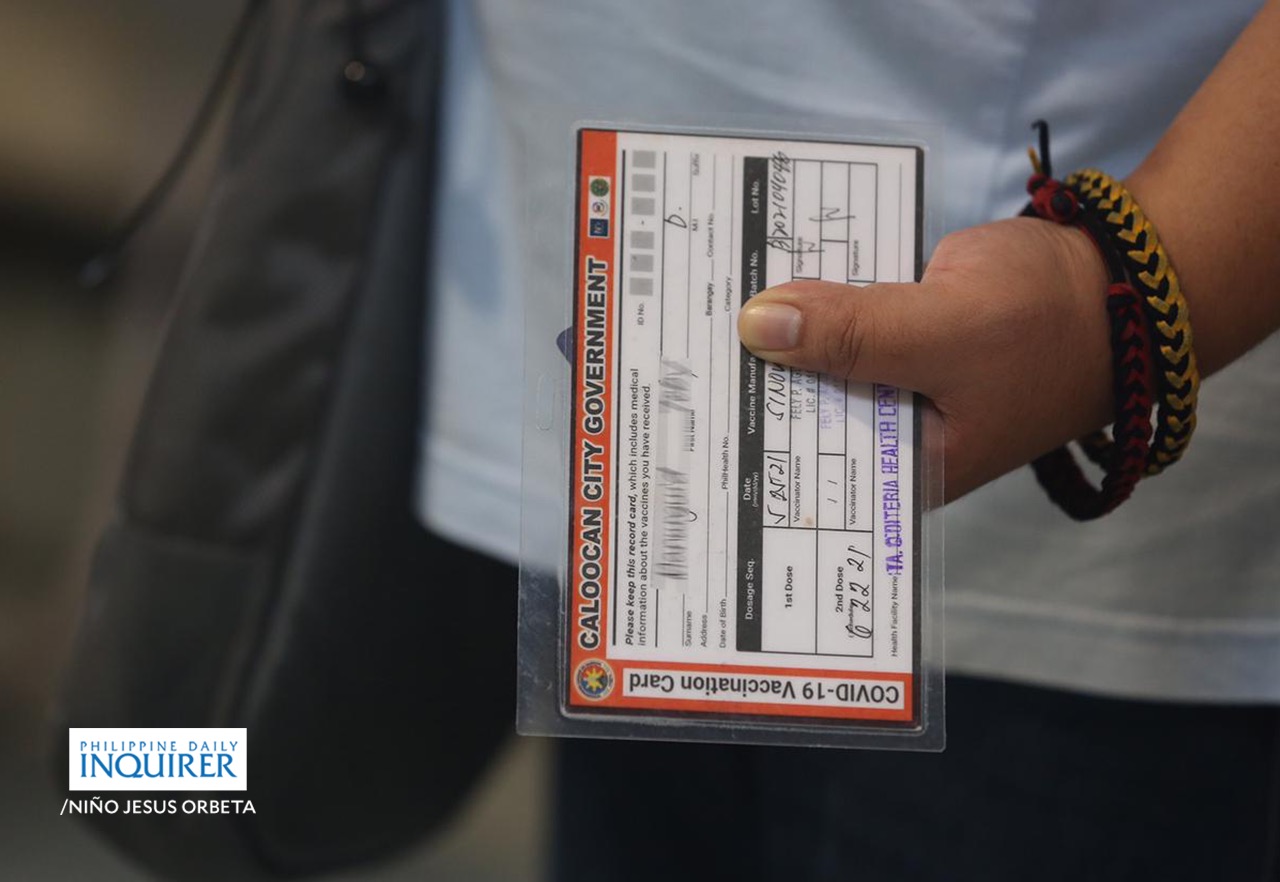‘No vax, no ride’ deemed unfair to PUV drivers, too

A passenger at MRT-3 shows a vaccine card issued by Caloocan City. FILE PHOTO
Lawmakers, labor and transport groups, and the Commission on Human Rights (CHR) on Thursday branded the “no vaccination, no ride” policy of the Department Transportation (DOTr) as “discriminatory” to people who depend on public transportation.
The measure, which says that only fully vaccinated individuals will be allowed access to all modes—whether by land, rail, air and sea—of public transportation within the capital region, takes effect starting Jan. 17.
“This is patent discrimination on workers and the poor who rely on public transport for mobility and commuting to work,” said Partido Manggagawa chair Rene Magtubo.
“In contrast, rich people, vaccinated or not, are free to move around since they have cars to use. These unfair and biased policies disproportionately impact people in the poorest sector,” he added.
Right to travel
The labor leader also noted that the policy was tantamount to making unvaccinated workers go on “forced leave since they cannot commute to work.”
Article continues after this advertisementThe policy also “unfairly makes jeepney drivers and operators responsible when unvaccinated commuters ride their vehicles,” Magtubo added.
Article continues after this advertisementA transport group said that limiting the access of unvaccinated people to public transportation would severely affect drivers of regular jeepneys, buses and even tricycles within Metro Manila, insisting that the policy violated one’s right to travel.
While they are in support of vaccinating people for safety against COVID-19, Piston president Mody Floranda argued that the DOTr should have instead thought of a way to persuade commuters and drivers to be inoculated, instead of coming up with such regulation.
Other options
Calling it a form of discrimination against unvaccinated citizens, senators on Thursday urged the executive department to offer rewards instead of threatening them with punishment.
“For example, in trains or in (public utility buses), designated coaches or buses should be designated for riders who have not been jabbed,” Senate President Vicente Sotto III said.
He said the DOTr should also explore alternative means to convince the public to avail themselves of its free vaccination program.
“There are many options, but to destabilize the means of transportation of our people should not be the only option. Think. Explore. There are plenty of other ways to fight the pandemic,” Sotto said.
But while Sen. Nancy Binay expressed openness to the policy, she wondered whether the DOTr has the capacity to effectively implement the policy.
“We must understand that the majority still take public transportation and most of them use public utility vehicles (PUVs), such as jeepneys, which are vulnerable because of the loading-unloading scheme of passengers,” she said.
Binay urged the DOTr to push for the mandatory retrofitting of PUVs as a “more practical approach” to allow proper distancing among passengers.
Sen. Joel Villanueva, chair of the Senate committee on labor, warned that a policy that provided “little to no viable alternative options” would only create resentment and animosity and further discourage citizens from getting jabbed.
Sen. Francis Pangilinan said the government must respect the citizens’ freedom of choice.
However, Sen. Grace Poe, chair of the Senate committee on public services, supported the policy, which, she said, was meant to protect the riding public.
CHR spokesperson Jacqueline de Guia warned that the new public transport policy “effectively restricts the exercise and enjoyment of fundamental rights,” and urged the government to instead address vaccine hesitancy instead of resorting to “fear or force” to intimidate the public into getting vaccinated.
Parens patriae
It said the government’s anti-COVID-19 task force has repeatedly invoked the parens patriae doctrine to impose sweeping restrictions against Filipinos who have yet to be inoculated. (Derived from the Latin phrase for “parent of the people,” the legal doctrine holds that the government is the protector of citizens unable to protect themselves.)
However, the commission asserted that such restrictions must be legal, necessary, consistent with other recognized rights, and proportional to their aim of protecting public health. “Without a law detailing the precise parameter for the restriction of rights, the policy restricting rights runs into the danger of being sweeping and overly broad that assaults even personal liberties,” De Guia said.
To prevent shutdown
The DOTr on Thursday defended the new policy, arguing that it was meant to prevent another shutdown of public transport similar to what happened during the early days of the pandemic.
“We are doing everything we can to maintain and keep our public transport operations safe and running. If we shut down all modes of public transportation due to rising cases of COVID-19, it would be more inconvenient to the people,” DOTr spokesperson Goddes Libiran said in a statement. —With reports from KRIXIA SUBINGSUBING and DONA Z. PAZZIBUGAN